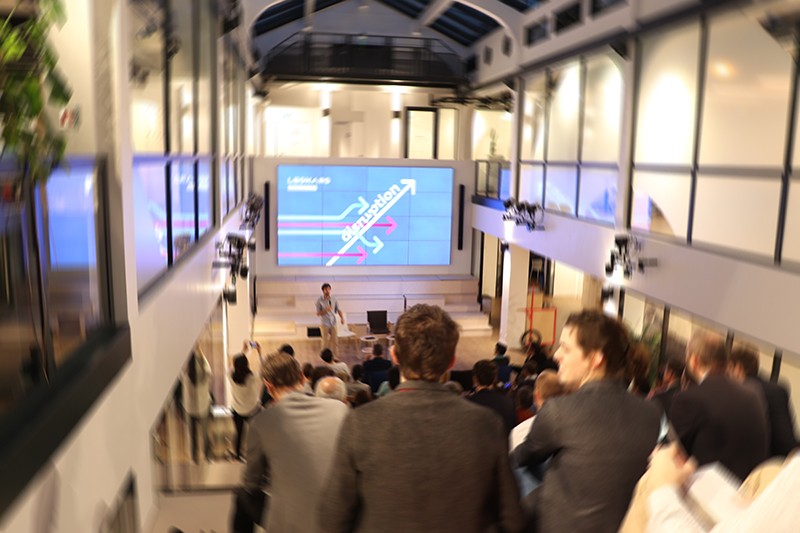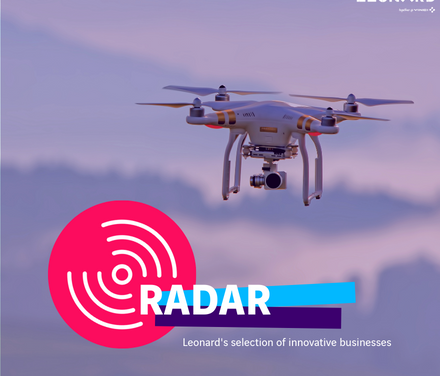Of course, the recent disappointing performance of Uber (whose valuation plummeted nearly 20 billion since its IPO) or WeWork has slightly dampened the appeal of unicorns. But disruption is not going anywhere, as the reality in many industries continues to show: with the power of technology and new players capable of leveraging it, sudden transformation threatens to rear its head in nearly every sector.
After pursuing this task for several months, we are now ready to deliver our conclusions. To respond to disruption, we must first understand it, break it down and demystify it, so we do not become its prisoners. To that end, we have unpacked this phenomenon, submitted to the expert eye of specialists and sought out answers, using a method we first employed at Leonard to study resilient cities and autonomous vehicles.

We presented our results on October 17 in the welcoming confines of Leonard:Paris, together with Pierre-Guy Amand, a “résistant à la disruption”. You can discover our conclusions here and browse the full presentation over here.
Embracing disruption means looking at it not as a new, fast and sudden phenomenon, but instead as a permanent dynamic that demands constant attention from established players.
For me, three lessons stand out from the report: three stances for weathering the storm of disruption.
The first is an attitude. Tech circles like to talk about the innovator’s dilemma, a concept popularized by Clayton Christensen, who invented the notion of disruption.
It describes the paradox of highly efficient, optimized groups that excel in their field: the better they are, the harder it is for them to accept disruptive innovation.
Leonard grew out of this idea: to cope with future transformation and disruption, we need to create an open space where we can tackle these changes head on, give them the attention they require and look at them from a fresh perspective. We need to promote and amplify such efforts to shift our perspective. This is the attitude we aim to cultivate at Leonard, so we can seize on disruption opportunities as soon as they arise within infrastructure, cities and their attendant services.
For the VINCI Group, this means working hard to grant our dedicated organization with autonomy, resources and a spirit of critical inquiry with a dedicated structure. I’m grateful for this opportunity!
Of course, each organization will have to work out their own way of solving this problem, but I think the keys are always the same: cultivating an open mindset and providing the time and resources to those who are most capable of offering a fresh perspective on the sector, the people who can take the necessary step back to see the big picture. Don’t be afraid to take a less conventional approach at any step in the project!
Second lesson: talent is critical – it may seem obvious, but it’s a crucial point. It includes the talent recruited from outside the company, as well as the talented employees that companies train, mobilize to rethink business internally. Whether it comes to environmental challenges or launching an AI project, growing a diverse, fertile and open breeding ground for talent is always one of our central recommendations.
The reason is that this is one of the best answers to disruption: every time you integrate a new partner into your network, hire a new employee or mobilize your teams on different topics, you are expanding the range of value that you are capable of leveraging.
Finally, successfully navigating disruption always means focusing on the customer. It’s one of the positive takeaways from a few traditional taxi companies response to competition from Uber: their success hinges on customer loyalty. As value chains continue to shift dramatically towards the customer side, businesses need to work with customers to reinvent the sector in order to ensure their future success.
This approach is notably taken by Waste Marketplace, one of the resident startups at Leonard:Paris. After identifying an unmet need of its site manager customers, it rolled out a solution to simplify the waste management process. By listening patiently and bringing a fresh perspective to the expectations and frustrations expressed by customers, Jérôme de Tomasi has only just begun to develop new customer-centric solutions. It’s not always easy, especially in sectors like ours, where the customer is sometimes seen as an obstacle to the project or construction. Knowing how to consider and work with the customer is a unique challenge.
Adopting the right attitude, attracting the best talent, focusing on the end customer: these are just a few of the keys to coping with disruption.
This tension is likely to persist for quite some time: embracing disruption means looking at it not as a new, fast and sudden phenomenon, but instead as a permanent dynamic that demands constant attention from established players. This is the task we have taken up at Leonard, VINCI’s foresight and innovation platform, together with our partners: operational teams committed to the transformation of their activities, startups and investors.

